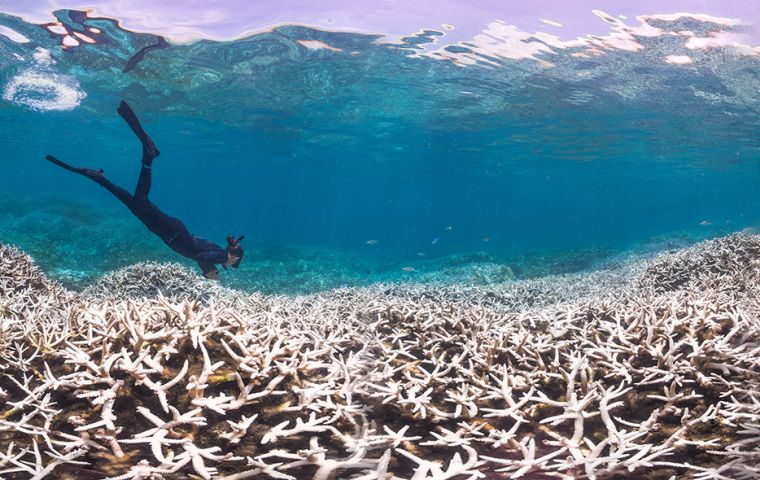MercoPress. South Atlantic News Agency
Ocean life to disappear if climate change not addressed, study warns
 Man-caused habitat destruction, overfishing and coastal pollution also lead to the termination of sea life as we know it
Man-caused habitat destruction, overfishing and coastal pollution also lead to the termination of sea life as we know it According to the findings of a study published Thursday in Science, if climate change is not curbed in time, the oceans will suffer a mass extinction as they did some 65 million years ago in the Cretaceous period when a meteorite and volcanoes wiped out life on Earth.
The study has pointed out that the greenhouse effect that warms the oceans and depletes their oxygen, coupled with habitat destruction, overfishing, and coastal pollution, will wipe out marine life.
The article, signed by researchers from Princeton University, recalls that the emission of large amounts of anthropogenic greenhouse gases into the atmosphere is radically changing the Earth's climate system and threatening many species.
The study warns that “the future of ocean life as we know it under runaway climate change is uncertain,” although the impact of climate on biodiversity is difficult to observe, especially on ocean life, given the fossil record illustrating past episodes of mass extinction caused by global environmental changes.
Based on an extensive ecophysiological model, which weighs the physiological limits of a species against forecasts of marine temperature and oxygen, the study's authors, Justin Penn and Curtis Deutsch assessed the extinction risk of ocean species under different climate warming scenarios.
If global temperature rise remains unchanged, marine ecosystems around the globe are likely to suffer mass extinctions similar in size and severity to that of the late Permian - the “Great Mortality” - which occurred about 250 million years ago and resulted in the disappearance of more than two-thirds of marine animals, the study determined.
It also showed tropical oceans will most likely lose the most species to climate change, although many of them will migrate to higher latitudes and more favorable conditions for survival. Polar species, however, are very likely to become globally extinct, as their habitats will completely disappear.
In a paper published alongside the study in Science, Rutgers University (New Jersey) researchers Malin Pinsky and Alexa Fredston agree that “climate change is indeed pushing species out of the confines of the Earth.” But reducing greenhouse gas emissions could reverse the risk of extinction by up to 70%, the specialists pointed out. Hence, the move in that direction is now “a global priority.”
“Whether humanity faces the worst or best-case scenario will depend on the choices society makes, not only on climate change, but also on habitat destruction, overfishing and coastal pollution,” they warned. But “with a coordinated approach that addresses multiple threats, ocean life as we know it has the best chance of surviving this century and beyond,” Pinsky and Fredston underlined. (Source: EFE)




Top Comments
Disclaimer & comment rulesCommenting for this story is now closed.
If you have a Facebook account, become a fan and comment on our Facebook Page!